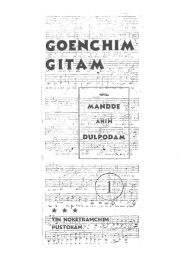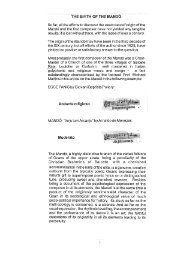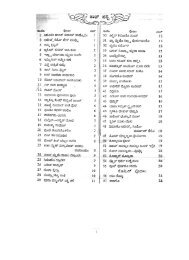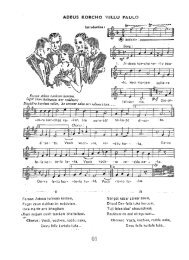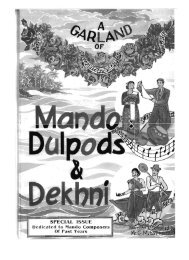Lyrics with translation - Songs from Goa
Lyrics with translation - Songs from Goa
Lyrics with translation - Songs from Goa
Create successful ePaper yourself
Turn your PDF publications into a flip-book with our unique Google optimized e-Paper software.
Third Mando Festival in Panaji, <strong>Goa</strong><br />
11/12 th November, 1967<br />
Sponsered by<br />
Clube Nacional, Panaji<br />
Published by<br />
Konknni Bhasha Mandal, Panaji, <strong>Goa</strong> 403 001
Prostavna / Don Utram / Preface<br />
Aiz hem pustok uzvaddak kaddunk amkam vhodd sontos ani obhinam bhogta. Ami<br />
rauntav Konkani Bhas uloitole ani ti apli Maim-bhas mhunn manum ghetele hem pustok<br />
khoxalkaien vapuddtole mhunn.<br />
I have not been able to contact the author of this publication nor to get his or her<br />
biographical data. Since it is not available for sale outside <strong>Goa</strong>, I am taking the risk of<br />
publishing it on this website. I take this opportunity to thank him for her or his or her<br />
contribution to <strong>Songs</strong> <strong>from</strong> <strong>Goa</strong> in Konkani.<br />
The plural of deknni in Konkani remains the same, that of dulpod is dulpodam and that<br />
of manddo is mandde. In English it is deknnis and dulpods in the plural, mando in the<br />
singular and mandos in the plural.<br />
Miho Lee has defined the “musical form” of all the deknnis, dulpods and mandos on<br />
this website. This biography is based on information given by her.<br />
Miho Lee was born in Seoul, Korea. She studied music at the Seoul National University<br />
and then migrated to Vienna where she studied Music-Science (Musikwissenschaft),<br />
Theatre-Science (Theaterwissenschaft) and German Studies (Germanistik) at the<br />
University of Vienna, where she graduated <strong>with</strong> an M.A. She is at present (2005)<br />
working on her Ph.D. Thesis and is also Lecturer for Korean Language and Literature at<br />
the University of Vienna.<br />
Editorial date: June 2012<br />
Dr. Lourenco Noronha<br />
E-mail: noronha@gmx.at
Names of plants and flowers<br />
mentioned in deknnis, dulpods and mandos<br />
Provided by<br />
Romano Juliano Abreu<br />
<strong>from</strong><br />
Chorão, Tiswadi Taluka, <strong>Goa</strong> 403 102<br />
Konkani: Abolem (sing.), Abolim (plural))<br />
Two to three feet tall shrub <strong>with</strong> dark green leaves and flowers used to make garlands.<br />
English: Amaranth<br />
Botanical name: Crossandra Undulaefolia<br />
Konkani: Champo<br />
English: Champakaw Pagoda Tree<br />
A small tree <strong>with</strong> a smooth stem and scented flowers, red, yellow and white in colour.<br />
Botanical name: Plumeria Acutifolia<br />
Konkani: Condo Man<br />
Tall perennial grass <strong>with</strong> a hard stem used to build huts and to make mats.<br />
English: Bamboo<br />
Botanical name: Bambusa Bambose<br />
Konkani: Corno<br />
Small sized tree <strong>with</strong> long narrow shiny leaves and yellow bell shaped flowers. It is<br />
infested <strong>with</strong> bumble bees.<br />
English: Indian Oleander<br />
Botanical name: Thevetia Nerifolia<br />
Konkani: Erond or Galamarac<br />
A soft wooded shrub used for green fencing.<br />
English: Erond<br />
Botanical name: Jatropa Curca<br />
Konkani: Mogrim<br />
Shrub <strong>with</strong> weak skin which needs support. It bears white scented flowers which are<br />
used in making garlands.<br />
English: Jasmine<br />
Botanical name: Jasminum Species<br />
Konkani: Pongero<br />
Medium sized soft wooded tree <strong>with</strong> thorny trunk. It bears flame red flowers in summer.<br />
The wood is very light, hence used for boat-making.<br />
English: Coral tree<br />
Botanical name: Erythrina Indica
First Line of Mandos arranged in alphabetical order<br />
Aiz ami soglim ektthaim rê zaleam<br />
Amkam meuliai beantinnim<br />
Bara tera vorsam zalim (1)<br />
Bara tera vorsam zalim (2)<br />
Bhagintum boisunum hanv roddtalim<br />
Bhoun-bhoun ugddas korun tumcho<br />
Bollkuancheri rê boisotam<br />
Doriachea lharari<br />
Ek vorso bollandolem<br />
Hi tisri porob manddeanchi<br />
Janot bonvta Divaddeantu<br />
Janot bountalo Divaddeantum<br />
Kalliz bhettoilolea anjea<br />
Kedinch chintil´ naim rê hanvem<br />
Kitlo surek sundor amcho ganv<br />
Kosole zall volvolle, Saiba<br />
Nidunu go anturnari<br />
Novo tratu mure amcho<br />
Principio nixttur mhojea moga<br />
Rat dis Deva lagim magtalim<br />
Roddun dukam zali zori<br />
Saliganv ek daklo ganv<br />
Sangat(u) moga tuzo<br />
Sasnam, sasnam mhojea moga<br />
Setembrache choudave ratri<br />
Sobit suria vetoch somdirachea pottan<br />
Soglea sonvsarak bobau zala<br />
Soglench mhojem vido chintunum<br />
Soglench vido mu rê mhojem<br />
Sokallim fuddem hanv vetalom<br />
Suknnim sauzam korit thuim kantar<br />
Suria noketram porim porzolletai<br />
Tujea utrari rê patieunum<br />
Tuka polleun rê moga<br />
Un´unit otreg bhair kaddun<br />
Visvas dhovrun tujer sukha<br />
Xitoll chondrimache rati<br />
Zaitim dukham rê golloilim (1)<br />
Zaitim dukham rê golloilim (2)<br />
Zaito tempo zalo moga<br />
Zaito tempo zalo rê moga
<strong>Lyrics</strong> and <strong>translation</strong> arranged in alphabetical order of the First Line<br />
Aiz Ami Soglim Ektthaim Rê Zaleam<br />
We have all got togeteher today<br />
Type: Mando<br />
Source: Third Mando Festival, 11/12 th November 1967, Panaji. p. 72<br />
<strong>Lyrics</strong> and Music:<br />
Date: About 1967<br />
Musical form: Binary<br />
Literary form: Narrative<br />
Published 1967 by the Konknni Bhasha Mandal, Panaji<br />
Translated by:<br />
Aiz ami soglim ektthaim rê zaleam,<br />
Institut Menezes Bragançachea salavant,<br />
Dakhounk amchim Goenchim dulpodam,<br />
He bhaxen ami sodankal cholouncheak.<br />
Visro nezo Club Nacionalak,<br />
Khuxealponn dil’munn sogleank,<br />
Voir kaddun amche Goenche,<br />
Vhoddilanche mogall mandde.<br />
Devan bensaum ghalum,<br />
Hea Direcsanvcher.<br />
Ugddas ghal’munn mogacheam manddaencher,<br />
Khuxeal bhorit zalim amchim kallzam,<br />
Aikun aiz him Goenchim gaienam.<br />
+<br />
Amkam Meuliai Beatinnim<br />
We have met some middle-aged spinsters<br />
Type: Mando<br />
Source: Third Mando Festival, 11/12 th November 1967, Panaji. p. 15<br />
<strong>Lyrics</strong> and Music: Arnaldo de Menezes (1863-1917)<br />
Date:<br />
Musical form: Binary<br />
Literary form: Narrative<br />
Published 1967 by the Konknni Bhasha Mandal, Panaji<br />
Translated by Alfred Noronha, Panaji, <strong>Goa</strong>, 22.12.2004<br />
Amkam meuliai beatinnim,<br />
We have met some middle-aged spinsters,<br />
Distai saibinnicheo boinnim,<br />
They look like sisters of the Blessed Lady.<br />
Deucharacheo sangatinnim,<br />
They are actually companions of the devil.<br />
Sonvsar attapila tannim.
They have the world in their web.<br />
Estribilho /Refrain:<br />
Vichnunche bhaxen gunno tancho,<br />
Their character is like that of a scorpion,<br />
Sogllo sonvsar ulttun portuncho.<br />
To turn the world upside down.<br />
Sarkem dakhoitai anjeanchem,<br />
They behave like angels,<br />
Formo gheuno deucharachem,<br />
In the guise of a devil.<br />
Farsanchem ulounnem mu’rê tanchem,<br />
Their talk is so sweet,<br />
Choleanche toklek laichako pixem.<br />
Which even makes young men go crazy.<br />
Kudd dilea tanni marvako,<br />
The body has been given to a man,<br />
Atmo dhovorla deucharako,<br />
And the soul has been kept for a devil.<br />
He te kumsodoriche burak,<br />
The holes of the confessional,<br />
Zoroitai bulichea patkako.<br />
Are worn out for the sin of deception.<br />
+<br />
Bara Tera Vorsam Zalim<br />
Twelve to thirteen years have passed<br />
Type: Mando<br />
Source: Lourdinho Baretto. Goemchem Git. Pustok 1, p. 20-21<br />
(May differ <strong>from</strong> the version of the Third Mando Festival.)<br />
<strong>Lyrics</strong> and Music:<br />
Date:<br />
Musical form: Ternary<br />
Literary form: Monologue<br />
Published 15.08.82. Printed by Pedro Barreto, Panaji<br />
Translated by Romano Abreu, Moira, June 2003<br />
Bara, tera vorsam zalim,<br />
Twelve to thirteen years have passed,<br />
Bara, diss(u) nhoi rê disle,<br />
Like not more than ten days<br />
Atte vitte zaite kaddle,<br />
I underwent a lot of trials and troubles<br />
Martirio rê bhogile,<br />
And suffered much.<br />
Devan churchur’ amche kele.
God had pity on us.<br />
Chusmo/ Refrain:<br />
Ai, io io rê, io io rê moga,<br />
Come, come, come my love<br />
Otreketam tuka.<br />
I am longing for you.<br />
Tujea utrar rê patieunum,<br />
Trusting in your word<br />
Aiz pasun ankvar raulim hanvum,<br />
I remained a spinster till today.<br />
Tum borea dekhicho mhunnunum,<br />
Because you are of good character,<br />
Mhoji khoxi tunvem korunum,<br />
You fulfilled my wishes,<br />
Aiz feliz zalim hanvum. (Chusmo)<br />
I am happy today.<br />
Xekim kalliz zalem dhadoxi,<br />
Finally my heart was satisfied,<br />
Kallzar paus otloi ghosgoxi,<br />
You appeased my heart (lit. You poured ample rain on my heart).<br />
Kedinch zaunchim nhoim rê doxi,<br />
We shall never part.<br />
Puro dogaink ekuch 1 boxi. (Chusmo)<br />
We need just one plate for both of us.<br />
+<br />
Bhaguinto Bossun Aum Rhortalim (Rozerichem Ful)<br />
I wept sitting in the garden (The rose flower)<br />
Type: Mando<br />
Source: J.A.A. Fernandes, vulgo: André Xett (1884-1980). Manuscript 1971.<br />
Song No. 6. Bogtavaddo, Chorão<br />
(May differ <strong>from</strong> the version of the Third Mando Festival.)<br />
<strong>Lyrics</strong> and Music:<br />
Date:<br />
Musical form: Binary<br />
Literary form: Monologue<br />
Translated by Olivinho Gomes (1943-). University of <strong>Goa</strong>, 2001<br />
Bhaguinto bossun aum rortalim,<br />
1 It may refer to the fact that even a frugal life can be a happy life if love prevails at<br />
home. It may also refer to the <strong>Goa</strong>n tradition of a bride and bridegroom sharing rice<br />
<strong>from</strong> a common plate as a symbol of consent to marriage. The word “vatli” for plate<br />
may have been derived <strong>from</strong> “vatunk” meaning “to share”. The wedding ring and the<br />
word “Yes” as a sign of consent was brought by the Europeans to <strong>Goa</strong>. (L. Noronha).
I was weeping sitting in the garden,<br />
Eksurponum mojem ulastalim,<br />
Sighing <strong>with</strong> sorrow at my loneliness,<br />
Roz(e)richem ful tuvem diunum,<br />
By giving a rose flower into my hands,<br />
Nodor mojer gatloli moganu.<br />
You have looked at me <strong>with</strong> love.<br />
Utor mojea ailem nam tonddako,<br />
No word issued <strong>from</strong> your mouth<br />
Môg tuzo assa mhun sangcheako.<br />
To say that I was in love <strong>with</strong> you,<br />
Utor mojea ailem nam tonddako,<br />
No word issued <strong>from</strong> your mouth<br />
Môg tuzo assa mhun sangcheako.<br />
To say that I was in love <strong>with</strong> you.<br />
Tuum votrichi mum rê mannika,<br />
After you left, you know, my jewel,<br />
Volvolle bogle mojea kallzac,<br />
My heart began to writhe in pain,<br />
Rozerichem fulam hatan chounum,<br />
By looking at the rose flower in my hand,<br />
Kallzak mojea ditam hanv buzvonnum.<br />
I try to give some comfort to my heart.<br />
Kalliz mojem betouncheac tuka.<br />
To dedicate my heart to you,<br />
Papan maman lisens dil’rê maka.<br />
My parents have granted me the permission.<br />
Nanv tujem sanguilem nam rê maka,<br />
You have not told me your name,<br />
Kuim munn sodu(n)cho atam tuka.<br />
Where at all shall I seek you now?<br />
Sounsar soglo sorlear passunum,<br />
Even if the whole world ends,<br />
Rabtol’ tuka bhaguint hanv bolsunum.<br />
I will await your arrival sitting in the garden.<br />
Anjea pôrini udun punnum eunum,<br />
Come flying like an angel, at least,<br />
Sasnank maka gue rê tuj’ gopantum.<br />
Take me into your embrace for ever.<br />
+<br />
Bhoun-Bhoun Ugddas Korun Tumcho<br />
Thinking of you all and all again
Type: Mando<br />
Source: Third Mando Festival, 11/12.11.1967, Panaji. p. 71<br />
<strong>Lyrics</strong> and Music:<br />
Date:<br />
Musical form: Ternary<br />
Literary form: Admonition<br />
Published 1967 by the Konknni Bhasha Mandal, Panaji<br />
Translated by Alfred Noronha, Panaji, <strong>Goa</strong>, 22.12.2004<br />
Bhoun-bhoun ugddas korun tumcho,<br />
Thinking of you all again and again,<br />
Fugar zata jivu mhozo.<br />
My life is choked <strong>with</strong> emotion.<br />
Bangarachem Goem hanvum,<br />
I am the Golden <strong>Goa</strong>,<br />
Bhurgeam-viret hanvem kitem korum?<br />
What am I to do <strong>with</strong>out my children?<br />
Chusmo/ Refrain:<br />
Khuinsoruch tumi asum,<br />
Wherever you may be,<br />
Maenko kedinch naka visrum.<br />
Never forget your mother.<br />
Sogllea sonusarak ximpoddlea tu’,<br />
You are spread all over the world,<br />
Mhoje mogache put-natu,<br />
My beloved sons and grandsons.<br />
Bhou-korn Afrikek vetatu,<br />
Most of you go to Africa,<br />
Motiam-mannkam zoddun gheunchiaku.<br />
To earn pearls and jewels.<br />
+<br />
Bolcavantum Aum Bossotam<br />
I am sitting in the balcony<br />
Type: Mando<br />
Source: J.A.A. Fernandes, vulgo: André Xett (1884-1980). Cantarancho Album. Song<br />
No. 19. Bogtavaddo, Chorão<br />
(May differ <strong>from</strong> the version of the Third Mando Festival.)<br />
<strong>Lyrics</strong> and Music:<br />
Date:<br />
Musical form: Ternary<br />
Literary form: Monologue<br />
Published 28.04.1953. Printed by Codialbail Press, Mangalore, Karnataka<br />
Translated by António Vicente de Noronha (1895-1982), Chorão, July 1981<br />
Bolcavanto ãum bosotam (boisotam),
I am sitting in the balcony,<br />
Amchem cantar ãum muntam,<br />
I am singing our song,<br />
Ducãchêu zôri ãum roddtam,<br />
I am weeping streams of tears,<br />
Kedonam étolo to chintam.<br />
I am thinking: ‘When will he return.’<br />
Chusmo/ Refrain:<br />
Axênum rabotam,<br />
I am waiting anxiously,<br />
Kedonam étolo to chintam.<br />
And thinking: ‘When will he return.’<br />
Tea Instruzachea dissa,<br />
On that Carneval-Day,<br />
Avem kitem sanglolem tuka.<br />
What did I tell you?<br />
Tednam côuvun ailolem maca,<br />
At that time I came to know,<br />
Mozo affecto assa munn tuka. (Chusmo)<br />
That you had affection for me. (Refrain)<br />
Tujo môgu aslolo munum,<br />
On account of your love for me,<br />
Sõvnsar gatlo avem moddunũ.<br />
I disregarded the world.<br />
Atam videa eco corunum,<br />
Now uniting our lives,<br />
Mogacho abras di rê punnum.<br />
Give me at least one embrace of love.<br />
+<br />
Doriachea Lharari<br />
Upon the waves of the sea<br />
Type: Mando<br />
Source: Lourdinho Barreto. Goemchem Git. Pustok 1, p. 58-59<br />
<strong>Lyrics</strong> and Music:<br />
(May differ <strong>from</strong> the version of the Third Mando Festival.)<br />
Date:<br />
Musical form: Ternary<br />
Literary form: Monologue<br />
Published 15.08.82. Printed by Pedro Barreto, Panaji<br />
Translated by Lourenco Noronha, Vienna, 22.04.2001<br />
Doriachea lharari,<br />
Upon the waves of the sea,<br />
Chondrimachea uzvaddari,
And in the light of the moon,<br />
Hea mojea kensanchea fantieri,<br />
Upon the pleath of my hair,<br />
Jurar zatam Deva mukari.<br />
I give an oath in the presence of God.<br />
Chusmo/ Refrain:<br />
Io rê moga, choi rê mhaka,<br />
Come my love, look at me,<br />
Mogache dolle lai rê mhaka.<br />
Give me a loving look.<br />
Anj(u) tum rê arkanj(u),<br />
You are an angel, an archangel,<br />
Kerobim adorad(u),<br />
An adorable Cherubim,<br />
Ho amcho ekuch mhum rê “Pacto”,<br />
Since this is our only union,<br />
Jurament(u) zaum dhi rê sagrad(u). (Chusmo)<br />
Lay an oath and it will be sacred. (Refrain)<br />
Rati nidênt hanv sopnetam,<br />
When I sleep at night I dream,<br />
Uttun abras diuncheak vetam,<br />
Standing up I go to embrace you,<br />
Zagim zaun rê fottoutam,<br />
When I wake up I find myself deceived,<br />
He martir tukach rê bhettoitam. (Chusmo)<br />
These (my) sufferings I offer to you. (Refrain)<br />
+<br />
Eko Vorso Bolanddilem<br />
I have lived through one year<br />
Type: Mando<br />
Source: Pereira, José/ Martins, Michael. Song of <strong>Goa</strong>. pp. 108-109<br />
(May differ <strong>from</strong> the version in the Third Mando Festival.)<br />
<strong>Lyrics</strong> and Music: Paolo Milagres Silva (1855-1931) 2<br />
Date: About 1884<br />
Musical form: Ternary<br />
Literary form: Dialogue<br />
Published 2000. Aryan Books International,Pooja Apartments, 4B, Ansari Road, Darya<br />
Translated by José Pereira<br />
Tsolo/Boy:<br />
2 This mando was sung at the wedding of Paolo Vicente de Santana dos Milagres Silva<br />
(aged 29) and Maria Esperança Isménia Ermelinda Rita Fernandes of Orgaum, Lotlli<br />
(aged 13) on 19.04.1884. (José Pereira).
Eko vorso bolanddilem,<br />
I have lived through one year,<br />
Moga tujem esp’ranso sanddilem.<br />
And have lost all hope, my darling.<br />
Tujem paixaum rigololem,<br />
The passion for you, which entered me,<br />
Y asa muja kallyzam’ fintsololem.<br />
Is deeply entrenched in my heart.<br />
Dizgrasado amchi sorti.<br />
Unhappy destiny mine!<br />
Moga tunvem keli maka fatti.<br />
My love, you have turned your back on me.<br />
Tuzo ugddas mak’ sangati,<br />
Your memory will be my companion,<br />
Zaleary pasunum muji mati.<br />
Even when I become dust.<br />
Tsoli/Girl:<br />
Esperanso y amchem vorho.<br />
Great our hope now!<br />
Lottule Orgaum mujem goro.<br />
My home is at Orgaum in Loutulim.<br />
Fonddem sanum yetorichi,<br />
When you get back <strong>from</strong> Fondemm (Pondá),<br />
Mannyka tumgery apoin maka voro.<br />
My dear, come to take me to your home.<br />
Moga mujery gali dolle,<br />
Love, turn your eyes on me,<br />
Kity’m aum bogitam tem polle.<br />
And see what I endure.<br />
+<br />
Hi Tisri Porob Manddeanchi<br />
This is the Third Mando Festival<br />
Type: Mando<br />
Source: Third Mando Festival, 11/12.11.1967, Panaji. p. 51<br />
<strong>Lyrics</strong> and Music: Vincente Nunes<br />
Date:<br />
Musical form: Ternary<br />
Literary form: Narrative<br />
Published 1967 by the Konknni Bhasha Mandal, Panaji<br />
Translated by Alfred Noronha, Panaji, <strong>Goa</strong>, 22.12.2004<br />
Hi tisri porob manddeanchi,<br />
This is the Third Mando Festival,<br />
Borea vellar taji euzonn aili,
(In good time its understanding?)<br />
Dista tajem bim Paranjoti,<br />
(Looks like Paranjoti seeds?)<br />
Arnald Torkat Gizelinachi.<br />
Arnaldo, Torquato and Gizelino 3<br />
Estrebilho/ Refrain:<br />
Ugddas atam tancho eta,<br />
I remember them now,<br />
Amchea mukhar te ube asat dista.<br />
Looks as if they are standing before us.<br />
Man favo Bernard Fernandisako,<br />
Congratulations are due to Bernard Fernandes,<br />
Ani taka adar dinareanko,<br />
And to those who assisted him.<br />
Ami somest mar’ia ulo,<br />
Let us all hope and pray,<br />
Hea fuddem tanni cholouncheako.<br />
That they may continue in this way.<br />
Estrebilho/ Refrain:<br />
Ani toxench borem magoia ami,<br />
So let us all congratulate,<br />
Mogachea Konknni Bhaxa Manddalako.<br />
Our beloved Konkanni Bhaxa Mandal.<br />
+<br />
Janot Bountam Divadeantum<br />
I am walking about in Divar well-dressed<br />
Type: Mando<br />
Source: J.A.A. Fernandes, vulgo: André Xett. (1884-1980). Album Cantarancho. Song<br />
No. 47. Bogtavaddo, Chorão<br />
(May differ <strong>from</strong> the version of the Third Mando Festival.)<br />
<strong>Lyrics</strong> and Music:<br />
Date:<br />
Musical form: Ternary<br />
Literary form: Dialogue<br />
Published 28.04.1953. Printed by the Codialbail Press, Mangalore, Karnataka<br />
Translated by António Vicente de Noronha (1895-1982), Pandavaddo, Chorão, July<br />
1981<br />
Janot bõuntam Divadeantum,<br />
I am walking about in Divar well-dressed,<br />
Escrituram galun bolsantum.<br />
3 These names probably refer to the composers Arnaldo de Menezes (1863-1917),<br />
Torquato de Figueiredo (1876-1948) and Gizelino Rebelo (1857-1931). (L. Noronha).
With documents in my pocket.<br />
Sogleanc desprezar corunum,<br />
Dispising everybody,<br />
Vôdvic aplê mãmanchi sangunum.<br />
Boasting about how great my mother is.<br />
Chusmo/ Refrain:<br />
Naca naca sangunaca,<br />
No, no, don’t tell us,<br />
Volcotam amim tica.<br />
We know her.<br />
Mamã missac veta tuji,<br />
Your mother goes to Mass,<br />
Vôllu gal’lunum pinzlôli.<br />
Wearing a torn sari.<br />
Hi gôrbidad rê tuji,<br />
Is that what you are proud about?<br />
Mam-tio munta Rán-pinum amchi.<br />
Your father’s brother says that she is their cook.<br />
Chusmo/ Refrain:<br />
Kuim pauli gorbidade tuji,<br />
Where has your pride gone to,<br />
Dusreanc kentai ti.<br />
While you mock others.<br />
Ti randdú nõuri tuzi,<br />
That widow bride of yours,<br />
Sunum lanem familichi,<br />
Daughter-in-law of a poor family,<br />
Conductanam nuim rê tosli,<br />
Her behaviour is not of a high standard,<br />
Dêcun minddea tuka rê sampodli.<br />
That’s why, you loafer, got her.<br />
Chusmo/ Refrain:<br />
Dotú 4 tuka meula tituli,<br />
You received lot of dowry,<br />
Nôuri dekun tosli.<br />
4 The dowry, a sign of respect, is known in Konkani as dôt and dennem (gift) or<br />
stridhana. It originally consisted of ornaments and clothes for the bride and money as a<br />
contingent fund. It was her share of the inheritance and gave her a feeling of equality<br />
<strong>with</strong> her brothers. Although it is sometimes subject to abuses it should be retained, at<br />
least in a symbolical manner. Some of the mandos in which dowry is mentioned: Janot<br />
bountam Divadeantum, Môgu aum cortalim rê tujo, Neketranchea uzvaddanum, Soglem<br />
dizgras mujem tsounum, Soglem vido murê mhujem, Soglem vidu mun rê mojem,<br />
Soglench vidu mhun rê mhojem, Sokanny´m furhem uttunum, Thoddo tempo zalo<br />
passar, Tujea mogaco lagunum. (L. Noronha).
Because the bride is of that character.<br />
+<br />
Kalliz Bhettoilolea Anjea<br />
Angel to whom my heart is dedicated<br />
Type: Mando<br />
Source: Lourdinho Barreto. Goemchem Git. Pustok 1, p. 18-19<br />
(May differ <strong>from</strong> the version of the Third Mando Festival.)<br />
<strong>Lyrics</strong> and Music:<br />
Date:<br />
Musical form: Ternary<br />
Literary form: Monologue<br />
Published 15.08.82. Printed by Pedro Barreto, Panaji<br />
Translated by Alfred Noronha, Panaji, <strong>Goa</strong>, 22.12.2004<br />
Kalliz bhettoilolea anjea,<br />
Angel to whom my heart is dedicated,<br />
Tristêz kiteak tum bhogita,<br />
Why are you suffering?<br />
Jurament(u) ditam tuka,<br />
I swear to you,<br />
Tuj’ bhogor konnuch naka mhaka.<br />
I do not want anyone but you.<br />
Chusmo/ Refrain:<br />
Io rê, io rê, anjea mhojea,<br />
Come, come, my angel,<br />
Gopant gheunk rautam tuka.<br />
I am waiting to hold you in my arms.<br />
Mar(u) far)u) zalear zaum,<br />
No matter if there is disagreement,<br />
Bhair(i) ghalear pasun ghalum,<br />
No matter even if we are sent out,<br />
Ekuch sangtol’ taka hanvum,<br />
I will tell him only one thing,<br />
Tachea bhogor konnuch mhak’ nak’ mhunnum. (Chusmo)<br />
That I do not want anyone else but her.<br />
Sangat amcho sasnnak togcho,<br />
May our union last for ever.<br />
Sukh dukh vaur(u) vanttun gheuncho,<br />
Let us share our happiness and sorrow,<br />
Dusman modhem nhoim rê rigcho,<br />
No enemy should get between us.<br />
Sacrament(u) sagrad rauncho. (Chusmo)<br />
Our marriage should remain sacred.
+<br />
Kedim’ Chintily’m Naim Rê Y Anvem<br />
Never did I dream<br />
Type: Mando<br />
Source: Pereira, José/ Martins, Michael. Song of <strong>Goa</strong>. pp. 154-155<br />
(May differ <strong>from</strong> the version of the Third Mando Festival.)<br />
<strong>Lyrics</strong> and Music: Torquato de Figueiredo (1876-1948) 5<br />
Date: Composed before 1918<br />
Musical form: Ternary<br />
Literary form: Dialogue<br />
Published 2000. Aryan Books International, Pooja Apartments, 4B, Ansari Road, Darya<br />
Ganj, New Delhi 110 002<br />
Translated by José Pereira<br />
Tsolo/Boy:<br />
Kedim’ chintily’m naim rê y anvem,<br />
Never did I dream,<br />
Maka bogot munn osolem.<br />
That anything like this could happen to me.<br />
Gopantulem mannink mujem,<br />
My bosom’s jewel,<br />
Gonnim’ porim urhun y atanch gelem.<br />
Flew away like an eagle (all) of a sudden.<br />
Ulas kallyzache,<br />
The heart sighs:<br />
Sodanch Devan maka nirmile.<br />
God has ever destined them for me!<br />
Tsoli/Girl:<br />
Sontap bogtai muja kallyza,<br />
Agonies afflict my heart,<br />
Eklich galun gel’ munn maka.<br />
Because you have gone, leaving me alone.<br />
Villapanim rorhtam tuka.<br />
I lament and cry for you.<br />
Kedinch moga yetol’ to sang maka.<br />
When will you return, love, tell me.<br />
Abras mogache,<br />
Your loving embraces,<br />
Yetai muja dolleankorhe.<br />
Come up before my eyes.<br />
Tsolo/Boy:<br />
5 Dedicated probably to a girl <strong>from</strong> Bannali (Beanaulim) when he was music tutor in<br />
that village. Theme: She did not share his friendship. (José Pereira).
Anvem sanddum’ naim rê tuka.<br />
I have not abandoned you!<br />
Tuj’ vinny’m sonsar maka naka.<br />
I cannot live <strong>with</strong>out you.<br />
Villapanim rorhum naka,<br />
Do not cry and lament, love,<br />
Bexttich moga y aflict tum zainaka.<br />
Tuzo môgu mannyka,<br />
My Precious, your love,<br />
Asa riglol’ muja kallyza.<br />
Is rooted in my heart.<br />
+<br />
Kitlo Surek Sundor Amcho Ganv (Ilha Divar)<br />
How beautiful is our country<br />
Type: Mando<br />
Source: Programme booklet of the Third Mando Festival, 11/12.11.1967, Panaji. p. 36<br />
<strong>Lyrics</strong> and Music:<br />
Date:<br />
Musical form: Binary<br />
Literary form: Praise Song<br />
Published 1967 by the Konknni Bhasha Mandal, Panaji<br />
Translated by Lourenco Noronha, Vienna, 16.02.2005<br />
Kitlo surek sundor amcho ganv,<br />
How beautiful is our country,<br />
Ilha Divar bai tujem nanv,<br />
“The Island of Divar” is your name, my lady,<br />
Chouxim dhauntat xitoll Ilaram,<br />
Cool waves lap around your sides,<br />
Bhagint pormolltat sobit fulam.<br />
Your gardens bear the perfume of beautiful flowers.<br />
Sundor kunvor tum Tisvaddechi,<br />
You are the beautiful princess of Tiswadi<br />
Matear mundoi chondrimachi,<br />
On your head shines the moon,<br />
Hatant mudi sat motieanchi,<br />
On your finger I see a ring <strong>with</strong> seven pearls,<br />
Sogleankuch apurbai tuji.<br />
Everyone looks to you <strong>with</strong> affection.<br />
Estrebilho / Refrain:<br />
Anink ganv na dusro, na dusro,<br />
There is no country,<br />
Maim tujea oslo.<br />
Mother, like you.
+<br />
Kossole Zall Volvole Saiba<br />
What agony and suffering<br />
Type: Mando<br />
Source: J.A.A. Fernandes, vulgo: André Xett (1884-1980). Song No. 31. Bogtavaddo,<br />
Chorão<br />
(May differ <strong>from</strong> the version of the Third Mando Festival.)<br />
<strong>Lyrics</strong> and Music:<br />
Date:<br />
Musical form: Ternary<br />
Literary form: Monologue<br />
Manuscript 1971<br />
Translated by Olivinho Gomes (1943-). University of <strong>Goa</strong>, 2001<br />
Kosle zall volvole Saiba,<br />
What agony and suffering this is mine, oh Lord,<br />
Bogtai gagur mhojea kallza.<br />
That tears at my broken heart.<br />
Bim, bim, paus podta.<br />
The rain falls pitter-patter,<br />
Eclo jiv’mozo midd’mideta.<br />
My lonely self of a life is a-tremble, scared.<br />
Babdeponum kossolem Saiba,<br />
What a pity of orphanhood, my Lord<br />
Nistur disfapsitai maca.<br />
Distress is tearing me to shreds.<br />
Kedinch visronaka maka,<br />
Never ever forget me,<br />
Gopantulea manca,<br />
My jewel in my embrace,<br />
Hea tujea mogan, rê anjea,<br />
In this your love, my angel,<br />
Kalliz mojem fotkoteta.<br />
My heart is on the boil.<br />
Sonvsarant na maca sukho,<br />
I have no happiness in this world,<br />
Tuka choilea rê bogoro,<br />
Until I am able to see you,<br />
Pordesponnant podla jiv mhozo,<br />
I have been condemned to exile,<br />
Eksurponn mhojean sonsunk nozo.<br />
I am unable to bear this loneliness.<br />
+
Nidunum Gô Anturmari (Mogeacho Ul´las)<br />
Lying on my bed (A sigh of love)<br />
Type: Mando<br />
Source: Programme booklet of the Third Mando Festival, 11/12.11.1967, Panaji. p. 14<br />
<strong>Lyrics</strong> and Music: Dr. Simplicio Viegas<br />
Date: Composed about 1967<br />
Musical form: Ternary<br />
Literary form: Monologue<br />
Published 1967 by the Konknni Bhasha Mandal, Panaji<br />
Translated by Alfred Noronha, Panaji, <strong>Goa</strong>, 22.12.2004<br />
Nidunn gô anturmari,<br />
Lying on my bed,<br />
Dukancheo kortam hanv zori, kortam hanv zori,<br />
I am shedding tears, shedding tears.<br />
Kim kim kallkio killeo roddun gô mannika,<br />
The sounds of the night, crying, my love,<br />
Ugddas haddtai maka.<br />
You bring back memories.<br />
Estrebilho / Refrain:<br />
Ai, ai bauli rompi,<br />
Ai, ai, the shoot has faded,<br />
Beijanim ximplolea mogachi.<br />
Which was wattered by kisses of love.<br />
Volvolle milmille mujea jivache,<br />
The suffering and anguish of my heart,<br />
Ugtte zatai ghave kallzache, ghave kallzache,<br />
The wounds of my heart are re-opened,<br />
Inosenti mon mhojem taka gô tuvem,<br />
My inocent mind,<br />
Traisanv kelem.<br />
You have betrayed.<br />
Kedinch chintunk naslem hanvem,<br />
It had never come to my mind,<br />
Tum maka korit mhonn oslem, korit mhonn oslem,<br />
That you would treat me this way.<br />
Bhurgeaponnari vid mhojem tuka bhettoilem,<br />
I had dedicated my young life to you,<br />
Disgrasad kelem.<br />
You have made a misery of it.<br />
+<br />
Novo Tratu Mhum Rê Amcho<br />
A new friendship is ours
Type: Mando<br />
Source: Lourdinho Barreto. Goemchem Git. Pustok 1, p. 24-25<br />
(May differ <strong>from</strong> the version of the Third Mando Festival)<br />
<strong>Lyrics</strong> and Music:<br />
Date:<br />
Musical form: Ternary<br />
Literary form: Dialogue<br />
Published 15.08.82. Printed by Pedro Barreto, Panaji<br />
Translated by Lourenco Noronha, Vienna, 22.04.2001<br />
Novo trat(u) mhum rê amcho,<br />
A new friendship is ours,<br />
Kallzak mhojea pettol’ uzo,<br />
My heart is on fire,<br />
Conselh’ aikon dusmanancho,<br />
Listening to the advice of the enemy,<br />
Môg(u) visronaka mhozo.<br />
Do not forget my love.<br />
Chusmo/ Refrain:<br />
Ingrat tum zalo khoro,<br />
You (male) are really getting ungrateful.<br />
Devan tuka feliz kelea puro.<br />
May God make you happy.<br />
Kalliz mojem rê fapsota,<br />
My heart is beating fast,<br />
Portun portun ugddas ieta.<br />
I remember you often.<br />
Kitem korun puttvolem tuka,<br />
How did you think of it,<br />
Eklich sanddun vecheak mhaka. (Chusmo)<br />
To leave me alone and go away.<br />
Fatrach’ kallzacho dekunum.<br />
Your heart is hard like a stone.<br />
Geloi mhaka rê sanddunum.<br />
You went away leaving me alone.<br />
Rott’tam dukar dukam golloinum,<br />
Now I am crying shedding tears,<br />
Hem tujem traisanv chintunum.<br />
Thinking about your infidelity ( treachery).<br />
+<br />
Principio Nixttur<br />
A sad beginning<br />
Type: Mando
Source: Lourdino Barreto. Goemchem Git. Pustok 2, p. 58 - 59<br />
(May differ <strong>from</strong> the version of the Third Mando Festival.)<br />
<strong>Lyrics</strong> and Music:<br />
Date:<br />
Musical form: Ternary<br />
Literary form: Monologue<br />
Published 25.03.1984. Printed by Pedro Barreto, Panaji<br />
Translated by Alfred Noronha, Panaji, <strong>Goa</strong>, 22.12.2004<br />
Principio nixttur mhojea moga,<br />
The first thing (The first time we met), my love,<br />
Hanv kaim ollkonaslim rê tuka,<br />
I did not know at all.<br />
Tum tujea primaguer ailol’ tea disa,<br />
When you had come to my cousin´s place,<br />
Mhojem kalliz bhettoilem tuka.<br />
I offered my heart to you.<br />
Chusmo/ Refrain:<br />
Sounsarantlo môg hangach urtolo,<br />
Our earthly love will remain here,<br />
Fatar fator khuim punn dhortolo,<br />
Somewhere stone will remain on stone,<br />
Tuzo ghat tukach rê bhoztolo.<br />
Your treachery will rebound on you.<br />
Somzon tunch mhunn mhozo fuddar,<br />
Convinced that only you were my future,<br />
Fronh’ tuka korun diloli bordar,<br />
I had sewn a decorated pillowcase for you,<br />
Ugddas kor mhozo nidtai tea vellar,<br />
Think of me when you go to sleep,<br />
Mhozo môg tujea kallzant aslear. (Chusmo)<br />
If you have love for me in your heart. (Refrain)<br />
Goinchea Saibachea festa dis (Saibinn Mãe de Deus-chia festa dis),<br />
On the feast day of St. Francis Xavier (on the feast day of Our Lady Mother of God)<br />
Moga tuka kel’li hanvem convit,<br />
I had invited you, my love,<br />
Sangatak dog zann addunum amig,<br />
Bringing two friends (male) as companions,<br />
Kalliz mhojem keleim rê divertir. (Chusmo/Refrain)<br />
You diverted my heart, my love. (Refrain)<br />
+<br />
Rat Dis Deva Lagim Magtalim (Môg Mhozo Ani Tuzo)<br />
I used to ask the Lord every day (My love and yours)<br />
Type: Mando
Source: Third Mando Festival, 11/12 th November 1967, Panaji. p. 48<br />
<strong>Lyrics</strong> and Music:<br />
Date:<br />
Musical form: Binary<br />
Literary form: Monologue<br />
Published 1967 by the Konknni Bhasha Mandal, Panaji<br />
Translated by Alfred Noronha, Panaji, <strong>Goa</strong>, 22.12.2004<br />
Rat dis Deva lagim magtalim,<br />
I used to ask the Lord every day,<br />
(I used to pray to <strong>Goa</strong> night and day),<br />
Tuji potin zaunk aunddetalim,<br />
I used to long to be your wife,<br />
Mogach’ ulas rê hanv soddtalim,<br />
I used to heave a sigh of love,<br />
Tuzoch môg kallzant nialltalim,<br />
In my heart there was love only for you.<br />
Anjea mojea tukach rê hanv rautalim.<br />
I was waiting only for you, my angel.<br />
Estrebilho / Refrain:<br />
Môg mhozo ani tuzo,<br />
My love and yours,<br />
Anjea jhelo fulancho,<br />
Is like a bouquet of flowers, my angel,<br />
Sodanch pormoll ami gheuncho tacho.<br />
We should always savour the flavour of it.<br />
Zaitim vorsan than kalliz mhojem,<br />
For the past many years,<br />
Tukach moga tem bhettoilelem,<br />
I had dedicated it only to you, my love.<br />
Tufan zatokuch rê mogachem,<br />
When there is a tempest of love,<br />
Suknneam porim varear uddtalem,<br />
It flew (will fly) away like a bird.<br />
Tujer nodor ghalunk rê axetalem.<br />
My heart was yearning for the sight of you.<br />
+<br />
Roddun Dukam Zali Zori (Beporva Kori Naka, Anjea)<br />
Tears flowed like a river (Do not dispose me, my angel)<br />
Type: Mando<br />
Source: Third Mando Festival, 11/12 th November 1967, Panaji. p. 24<br />
<strong>Lyrics</strong> and Music:<br />
Date:<br />
Musical form: Ternary<br />
Literary form: Monologue
Published 1967 by the Konknni Bhasha Mandal, Panaji<br />
Translated by Alfred Noronha, Panaji, <strong>Goa</strong>, 22.12.2004<br />
Roddun dukam zali zori,<br />
Tears flowed like a stream,<br />
Ieo punn he zorint tuje paim buddovunk.<br />
Come and at least dip your legs in this stream.<br />
He tuje paim zortai tinga,<br />
These legs that wear off there.<br />
Umanv ghetam, môg tuka bhettovunk.<br />
I´ll kiss them to dedicate my love.<br />
Estrebilho / Refrain:<br />
Ieo rê moga, beporva kori naka, Anjea!<br />
Come, my love, do not despise me, my angel!<br />
Ieo rê moga, kallzantulem magnnem mhojem tuka!<br />
Come, my love, this is my plea <strong>from</strong> my heart!<br />
Tujea dolleantum uzvadd choinum,<br />
Seeing the light in your eyes,<br />
Suria disttipoddlo ede raticho.<br />
I could see the sun at this late hour.<br />
He tuje dolle maka dampleari,<br />
Should these eyes be shut by me,<br />
Kalluk zatlo soglea sounsarako.<br />
The whole world will be plunged into darkness.<br />
Tuka dekla bogor, moga,<br />
Unless I see you, my love,<br />
Soglo jiv mhozo millmilleta,<br />
My whole being becomes uneasy,<br />
Tuje savllek choinum, Anjea,<br />
Just looking at your shadow, my angel,<br />
Nixttur noketr mhojem rê palovta.<br />
My evil star is dispersed.<br />
+<br />
Saliganv Ek Daklo Ganv (Sobit Saliganv)<br />
Saligão is a small village (Beautiful Saligão)<br />
Type: Mando<br />
Source: Third Mando Festival, 11/12 th November 1967, Panaji. p. 22<br />
<strong>Lyrics</strong>: Robert Vaz.<br />
Music: Eustaquinho Souza<br />
Date:<br />
Musical form: Ternary<br />
Literary form: Praise Song<br />
Published 1967 by the Konknni Bhasha Mandal, Panaji<br />
Translated by Alfred Noronha, Panaji, <strong>Goa</strong>, 22.12.2004
Saliganv ek daklo ganv,<br />
Saligão is a small village,<br />
Kitulem sobit tujem nanv,<br />
So sweet is your name.<br />
Saibinnin ghalun tujer bensanv,<br />
Our Lady having blessed you,<br />
Sogleak gazota tujem nanv.<br />
Your name is famous far and wide.<br />
Estribilho / Refrain:<br />
Sobit sobit kitulem tum sobit,<br />
Beautiful, beautiful, how beautiful you are,<br />
Mannik tum Goenchem porzollit.<br />
You are a resplendet jewel of <strong>Goa</strong>.<br />
Put tuje sogleak ximpddunum,<br />
Your sons who are spread all over,<br />
Nanv tujem voir voir kaddunum,<br />
Having brought up your name,<br />
Maink aple onod man zoddunum,<br />
Having earned fame and respect,<br />
Portotat tujea gopantum.<br />
Are returning to your arms.<br />
Sobit sobit kitulem tum sobit,<br />
Beautiful, beautiful, how beautiful you are,<br />
Sogleak put tuje man zoddit.<br />
Your sons have earned respect wherever they went.<br />
Putank tujeam mhunntai kole,<br />
Your sons are known as foxes,<br />
Chotur monan te bhorlole,<br />
They are very shrewd and alert.<br />
Muzg sogleak famad tor te asle,<br />
They (Some of them) were famous musicians all over (the world),<br />
Bisp voiz izner legun zale.<br />
They even (also) became bishops, doctors and engineers.<br />
Sobit sobit kitulem tum sobit,<br />
Beautiful, beautiful, how beautiful you are,<br />
Put tuje ekdom nanvadik.<br />
Your sons are very much respected.<br />
Duvo tujeo sodanch ansteo,<br />
Your daughters always have a smiling face,<br />
Khatai sekhun godd godd beleo,<br />
Because they eat tasty sweetmeats.<br />
Choitai titlei mat’tai tankam mittio,<br />
They fascinate all those who cast an eye on them,
Otai pixio korun toklio.<br />
They go <strong>with</strong> their heads in a turmoil.<br />
Sobit sobit kitulem tum sobit,<br />
Beautiful, beautiful how beautiful you are.<br />
Mhunntai tuka Goenchem Pariz.<br />
You are known as the Paris of <strong>Goa</strong>.<br />
+<br />
Sangato Moga Tuzo<br />
Your friendship, my love<br />
Type: Mando<br />
Source: Fourth Centenary Souvenir (1596-1996), St. John the Baptist Church Benaulim,<br />
p. 60, c/o Paço Patriarcal, Altinho Panaji, <strong>Goa</strong> 403 001<br />
<strong>Lyrics</strong> and Music: António João Dias 6<br />
Date: about 1914<br />
Musical form: Ternary<br />
Literary form: Monologue<br />
Published: Fourth Centenary Souvenir 1996<br />
Translated by Alfred Noronha, Panaji, <strong>Goa</strong>, 22.12.2004<br />
Sangato mogá tuzó<br />
Your companionship, my love,<br />
Suco sontosso jivachó<br />
Is the sheer joy of my life.<br />
Cuddint atmó astoná muzó,<br />
As long as there is life in my body,<br />
Môgu visrum nã gô tuzó.<br />
I will never forget your love.<br />
Cunvori mujea calzachi,<br />
You queen (virgin) of my heart,<br />
Diuti mugeam rê doleanchi,<br />
You light of my eyes,<br />
Religui´ mancam motianchi,<br />
An image <strong>with</strong> jewels and pearls,<br />
Sarquem chondrimã uzvadachi.<br />
Just like the light of the moon.<br />
Gopantum ghettileari tuká,<br />
When I hold you in my arms,<br />
6 Refer to the version in Pereira, José/Martins, Micael. 2000 : 162-163. The composer<br />
was a Roman Catholic priest <strong>from</strong> Bannali (Benaulim). Many <strong>Goa</strong>n priests who had<br />
studied Latin, Portuguese, Konkani and music composed mandos and church hymns,<br />
but preferred to remain annonymus. I have derived this conclusion <strong>from</strong> the type of<br />
Konkani used and the reference to liturgical items and Christian teaching. They also<br />
show a tendency to sublimise love. (L. Noronha).
Purmolo eta alecrinchó<br />
I get the scent of “alecrinchó”,<br />
Anim chiunteam mogoreanchó,<br />
And of Chrysantimums and Jasmine,<br />
Anim sorguincheam fulanchó.<br />
And of heavenly flowers.<br />
Chusmo/ Refrain:<br />
Orsanchi amizade gô amchi,<br />
Our friendship of many years,<br />
Zaunchi sasonanchi.<br />
Should last for ever.<br />
+<br />
Sasnna Sasnach’ Anjea Mhojea<br />
Forever forever, my love<br />
Type: Mando<br />
Source: Lourdino Barreto. Goemchem Git. Pustok 1, p. 54 - 55<br />
(May differ <strong>from</strong> the version of the Third Mando Festival.)<br />
Type: Mando<br />
Source: Lourdinho Barreto. Goemchem Git. Pustok 1, p. 54 - 55<br />
<strong>Lyrics</strong> and Music:<br />
Date:<br />
Musical form: Ternary<br />
Literary form: Monologue (Dialogue?)<br />
Published 15.08.82. Printed by Pedro Barreto, Panaji<br />
Translated by Alfred Noronha, Panaji, <strong>Goa</strong>, 22.12.2004<br />
Sasnna sasnach’ anjea mhojea,<br />
Forever and forever, my love,<br />
Devan mhaka bhettoili tuka,<br />
God has offered me (female) to you,<br />
Hea ojeapanchea vorsa,<br />
In this year of miracles,<br />
Hem mhojem kalliz ditam tuka.<br />
I am offering my heart to you.<br />
Chusmo/ Refrain:<br />
Io anjea io rê amcho fuddar kôr rê,<br />
Come, my angel, come, please seal our future,<br />
Zo amkam Devan formailol’,<br />
Which God has destined for us.<br />
Dêv besanv ghaltolo.<br />
God will shower his blessings (on us).<br />
Fulam bhitor ful tum moga,<br />
You are the most beautiful flower of all,<br />
Neketram mhodem tum surya,
You are the resplendent sun among the stars,<br />
Avoi-bapaigel’ tum kunvor(i),<br />
You are the princess (kunvori) of your father and mother,<br />
Aiz thaun zatol’ mhogel’ ranni. (Chusmo)<br />
From today you will be my queen. (Refrain)<br />
Choliam bhitor choli uxear,<br />
You are the smartest among the girls,<br />
Azun porian rauli ankvar,<br />
You remained a virgin up to now.<br />
Korun ghetam sobhemazar,<br />
I am making you before the whole world,<br />
Mhozo sasnach’ dhir(u) adhar. (Chusmo)<br />
My life´s comfort and help. (Refrain)<br />
+<br />
Setembrachê Choudavê Ratri. (Revolt of the Hindu Sepoys 1895) 7<br />
On the night of the 14 th of September<br />
Type: Mando<br />
Source: J.A.A. Fernandes, vulgo: André Xett (1884-1980). Album Cantaracho. Song<br />
No. 68. Bogtavaddo, Chorão<br />
(May differ <strong>from</strong> the version of the Third Mando Festival.)<br />
<strong>Lyrics</strong> and Music:<br />
Date:<br />
Musical form: Binary<br />
Literary form: Historical narrative<br />
Published 28.04.1953. Printed at the Codialbail Press, Mangalore, Karnataka<br />
Translated by António Vicente de Noronha (1895-1982), Pandavaddo, Chorão, July<br />
1981<br />
Setembrachê choudavê ratri,<br />
On the night of the 14 th of September,<br />
Pônjent zalirê bobati.<br />
There had been noise in Panaji.<br />
Soglê ratri vazoun corneti,<br />
Blowing their trumpets all the night,<br />
Sepoy sandun guele bainêti.<br />
The sepoys went away leaving their guns (bayonets).<br />
Daram dampun sarjent aslo guardaki.<br />
Having closed the door the sergeant was standing on guard.<br />
7 On the 14 th of September 1895 the company of Sepoys on their refusal to move into<br />
Mozambique where the Portuguese had established a colony in about 1840 got out of<br />
their barracks and camped at Nanuz, Satari. They received the support of the Rane. An<br />
expedition under Prince Dom Affonso encountered them on the 24 th of November 1895.<br />
Refer to Rodrigues, L.A.1977. “The Portuguese army in India”, in: Boletim do Instituto<br />
Menezes Bragança. Panaji. No. 114, pp. 99-110 and and my Essay to these Deknnis,<br />
Dulpods and Mandos. (L.Noronha).
Sogle sepoi ectaim zaunum,<br />
All the sepoys getting together,<br />
Bardezantlean guele marche corunum.<br />
Went along marching through Bardez.<br />
Tanim gupit coruu pacto.<br />
Having arranged a secret pact,<br />
Bairo sorun guele Satarico.<br />
They came out and went to Satari,<br />
Dada Raneanc mandun guetle chefo.<br />
Dada Rane taking notice of this gathered his chiefs.<br />
Portugalac khobor diunum,<br />
Having given news to Portugal,<br />
Forçu ailo monvar borunum.<br />
A man-o-war arrived full of soldiers.<br />
Dom Afonso Sataric vossunnum,<br />
Dom Afonso went to Satari,<br />
Bassaunim tancam corunum,<br />
Having given a promise to them,<br />
Sogleam Raneanc adlo (adle?) rê dôrunum.<br />
He caught all the Rane and brought them.<br />
+<br />
Sôbit Surya Vetoch<br />
When the sun sets<br />
Type: Mando<br />
Source: Lourdino Barreto. Goemchem Git. Pustok 1, p. 14-15<br />
(May differ <strong>from</strong> the version of the Third Mando Festival.)<br />
Type: Mando<br />
<strong>Lyrics</strong> and Music:<br />
Date: Composed<br />
Musical form: Ternary<br />
Literary form: Monologue<br />
Published 15.08.82. Printed by Pedro Barreto, Panaji<br />
Translated by Alfred Noronha, Panaji, <strong>Goa</strong>, 22.12.2004<br />
Sôbit surya vetoch somdirachea pottant,<br />
When the beautiful sun is (was) swallowed by the ocean,<br />
Môg ami kortaleanv fulanchea hortant,<br />
We used to make love in the flower garden.<br />
Chondrim liptalo kupant,<br />
The moon would hide behind the clouds,<br />
Udetalo dipkaunk,<br />
And reappear again to peep at us.<br />
Bhigbhigtalim noketram,<br />
The stars were twinkling,<br />
Lago nasli bhuk than.
We neither felt hungry nor thirsty.<br />
Chusmo/ Refrain:<br />
Mogachem ghaltanam mudoll,<br />
While we were in our love play,<br />
Sobit varem martalem xitoll,<br />
There was a cool wind blowing,<br />
Aso pasun sonvsarant,<br />
As long as we are alive,<br />
Kalliz dovorchem nitoll.<br />
We should keep our hearts pure.<br />
Môg ami kelo bosun fulanim,<br />
We made love sitting in the garden (sitting among the flowers),<br />
Dipkaun chondrimachea kirnanim,<br />
Dazzled by the light of the moon,<br />
Hatan dhorun jasmin,<br />
Holding Jasmine flowers in our hand,<br />
Mogachi sangtaleanv kannim,<br />
We would be (were) telling each other love stories.<br />
Ghovai amkam ditelim tim,<br />
They will stand witness,<br />
Fulam hortantlim. (Chusmo)<br />
Those flowers <strong>from</strong> the garden. (Refrain)<br />
Ratchi bilkul jem’ poddonasli mhaka,<br />
I would hardly get any sleep at night,<br />
Akho dis pollelea bhogor tuka,<br />
Without seeing you the whole day,<br />
Lhanponnich môg(u) kela,<br />
We fell in love since the time we were young,<br />
Vinchun kaddunum tuka,<br />
I chose you,<br />
Sobit fulam mukhar mhaka,<br />
Among the beautiful flowers,<br />
Jurament dila. (Chusmo)<br />
We swore to each other. (Refrain)<br />
+<br />
Soglea Sonvsarak Bobau Zala<br />
It has created a disturbanace throughout the country<br />
Type: Mando<br />
Source: Programme booklet of the Third Mando Festival, 11/12 th November 1967,<br />
Panaji. p. 60<br />
<strong>Lyrics</strong> and Music: Vincente Nunes<br />
Date:<br />
Musical form: Ternary<br />
Literary form: Appeal for National Consciousness
Published 1967 by the Konknni Bhasha Mandal, Panaji<br />
Translated by Alfred Noronha, Panaji, <strong>Goa</strong>, 22.12.2004<br />
Soglea sonvsarak bobau zala,<br />
It has created a disturbance throughout the country.<br />
Idvas vochot thoinsor utsau’la,<br />
Unhappiness has appeared wherever we go.<br />
Nimnno vogot dista paula,<br />
I think the last moment has arrived.<br />
Sogleak motto akhant aila,<br />
There is great fear everywhere.<br />
Devak ulo ami maruia.<br />
Let us call out to God.<br />
Estrebilho / Refrain:<br />
Sogle ami akttaim zauno magnem koria,<br />
Let us all gather together and pray.<br />
Sogle ami ekttaim zauno axirvad magoia.<br />
Let us all gather together and ask for help.<br />
Amkam soddvonn murê meuli,<br />
We have at last got our freedom.<br />
Toddea lokak punnu bhirant rigli,<br />
At least a few people have felt the fear,<br />
Kai bori sanskrutai amchea gaunchi,<br />
How wonderful is the peace in our land,<br />
Disan dis fankarche suateri,<br />
Instead of improving everyday,<br />
Soglich baon rê veteli?<br />
Will it all wilt and fade away.<br />
Esterbilho / Refrain:<br />
Zaum deva tuji khoxi, sorgar zata toxi,<br />
Be it according to your wish, o Lord, as it is in heaven,<br />
Pun amchi dispotti kott’ti, sogleank amkam tum di.<br />
But give us our daily bread.<br />
+<br />
Sogllench Mhojem Vidu Chintunum<br />
Contemplating on my whole life<br />
Type: Mando<br />
Source: Lourdino Barreto. Goemchem Git. Pustok 1, p. 68 - 69<br />
(May differ <strong>from</strong> the version of the Third Mando Festival.)<br />
<strong>Lyrics</strong> and Music:<br />
Date:<br />
Musical form: Ternary<br />
Literary form: Monologue<br />
Published 15.08.82. Printed by Pedro Barreto, Panaji
Translated by Alfred Noronha, Panaji, <strong>Goa</strong>, 22.12.2004<br />
Sogllench mhojem vid(u) chintunum,<br />
Contemplating on my whole life,<br />
Dukhan golloit’ hanvum,<br />
I am sheding tears,<br />
Sons’rant mhaka na mhun rê konnum,<br />
Because I do not have any friend in this world,<br />
Ditol’ ili bhuzvonum.<br />
To give me a little consolation.<br />
Chusmo/ Refrain:<br />
Rott’am, rott’am dukhan golloinum,<br />
I cry and cry shedding tears,<br />
Mhozo fuddar rê chintunum.<br />
Thinking of my future.<br />
Sonvsar sogllo dista fottkiro,<br />
This world is so deceitful,<br />
Dukhanim bhorlol’ dhorio,<br />
An ocean full of pain.<br />
Konn punn mhaka mellot sangtolo,<br />
Could I find anyone who would tell me,<br />
Assam hanv mhunn feliz(o). (Chusmo)<br />
That I am happy. (Refrain)<br />
Sottvê ratchem noketr(u) mhojem,<br />
This is the star of my seventh day.<br />
Uzvadd palvon gelem,<br />
It extinguished the light and faded,<br />
Noxib mhojem khorench rê futtkem,<br />
My luck is truly unfortunate,<br />
Kedinch na bodolchem. (Chusmo)<br />
It will never change. (Refrain)<br />
+<br />
Sogllench Vidu Mhum Rê Mhojem<br />
My whole life<br />
Type: Mando<br />
Source: Lourdino Barreto. Goemchem Git. Pustok 1, p. 64 - 65<br />
(May differ <strong>from</strong> the version of the Third Mando Festival.)<br />
<strong>Lyrics</strong> and Music:<br />
Date:<br />
Musical form: Binary<br />
Literary form: Monologue<br />
Published 15.08.82. Printed by Pedro Barreto, Panaji<br />
Translated by Lourenco Noronha, Vienna, 22.04.2001
Soglench vidu mhum rê mhojem,<br />
My whole life,<br />
Tujêch pasun(u) bhettoilolem.<br />
I had dedicated it to you alone.<br />
Ghuttan sanglol’ utor mhojem,<br />
The word which I had spoken,<br />
Sodanch motint(u) dhovorchem.<br />
We should always keep in mind.<br />
Chusmo/ Refrain:<br />
Khorench utor dilear mhaka,<br />
If you sincerely give me your promise,<br />
Hat paim zoroun feliz kortolom tuka.<br />
I (male) shall make you happy working (lit. rubbing) my feet and hands sore.<br />
Tuka dekhlolea vella,<br />
The moment I saw you,<br />
Sonsrach’ axea zali mhaka.<br />
I was glad to live in this world.<br />
Mhoji bhirmôt tum gheumnaka,<br />
Let not my curse come on you,<br />
Kazarachem utor dhi rê mhaka. (Chusmo)<br />
Promise to marry me (lit. give me your word of marriage). (Refrain)<br />
Moddgovantum mhozo ganvum.<br />
My home is in Margão.<br />
Simpatizar zattam hanvum,<br />
I like you,<br />
Dot(i) thoddi zalear zanvum,<br />
It does not matter if the dowry is small,<br />
Tujê lagim kazor zatol’ hanvum. (Chusmo)<br />
I (male) shall marry you. (Refrain)<br />
+<br />
Sokallim Fuddem Hanv Utt’talom<br />
I used to wake up early in the morning<br />
Type: Mando<br />
Source: Third Mando Festival, 11/12 th November 1967, Panaji. p. 44<br />
<strong>Lyrics</strong> and Music:<br />
Date:<br />
Musical form: Ternary<br />
Literary form: Monologue<br />
Published 1967 by the Konknni Bhasha Mandal, Panaji<br />
Translated by Alfred Noronha, Panaji, <strong>Goa</strong>, 22.12.2004<br />
Sokallim fuddem hanv utt’talom,<br />
I used to wake up early every morning,<br />
Tujea boglek hanv vetalom,
I used to go to you,<br />
Gommtteako vengu marun tujea,<br />
Putting my arms around your neck,<br />
Abras-beiju tuka ditalom.<br />
I used to embrace and kiss you.<br />
Estrebilho / Refrain:<br />
Moga, moga sanddinaka,<br />
My love, my love, do not leave me,<br />
Sopnanto punn distti podd gô maka.<br />
At least appear to me in my dreams.<br />
Tuzo ugddas etrich maka,<br />
When I think of you,<br />
Mojem kalliz fugar zata,<br />
My heart gets suffocated.<br />
Kitlei dusman mell’lear tuka,<br />
However many enemies you may encounter,<br />
Mhozo mogo visronaka.<br />
Do not forget my love.<br />
Anjeachem tujem sarkhem,<br />
You are just like an angel,<br />
Chondrimachea uzvaddachem,<br />
Like the light <strong>from</strong> the moon.<br />
Despidiro korchea vellar,<br />
At the time of saying goodbye,<br />
Choinastana tum gelolem.<br />
You (female) have gone off <strong>with</strong>out looking at me.<br />
+<br />
Surya Noketranche Porim Porzolta<br />
The sun is shining like stars<br />
(May differ <strong>from</strong> the version of the Third Mando Festival.)<br />
Type: Mando<br />
Source: Lourdino Barreto. Goemchem Git. Pustok 1, pg. 8-9<br />
<strong>Lyrics</strong> and Music:<br />
Date:<br />
Musical form: Ternary<br />
Literary form: Monologue<br />
Published 15.08.82. Printed by Pedro Barreto, Panaji<br />
Translated by Romano Abreu, Moira, June 2003<br />
Surya noketranchê porim porzollta,<br />
The sun is shining like stars,<br />
Mogachea mhojea anjea.<br />
My loving angel.<br />
Tum bemfeit mhunnun mannka,<br />
Because you are handsome/pretty, my Jewel,
Adorar(u) kortam tuka.<br />
I adore you.<br />
Chusmo/ Refrain:<br />
Io, io, gopantulea anjea,<br />
Come, come, my angel into my embrace,<br />
Ekuch punn beij(u) dhi rê mhaka.<br />
Give me at least one kiss.<br />
Alamabrad(u) tuje pole, mogreanche kolle,<br />
Alamabrad(u) your cheeks like Jasmine buds,<br />
Distai motiach’ zodde,<br />
They look like a pair of pearls,<br />
Jigjigetai mhoje dolle,<br />
My eyes are shining,<br />
Kalliz lobdol’rê tuje kodde. (Chusmo)<br />
My heart is in love <strong>with</strong> you. (Refrain)<br />
Tirxe, garxe tuje dolle, bigbigtai polle,<br />
Your squint eyes are blue and blinking,<br />
Bhultai sogle chole,<br />
All the boys are exicited over you.<br />
Axeun rautam zon’lakodde,<br />
I am standing at the window longing (and)<br />
Dixtti pottol’ mhunn bainkodde. (Chusmo)<br />
Hoping to see you at the well. (Refrain)<br />
+<br />
Tujea Utrar Rê Patieunum<br />
I rely on your word<br />
Type: Mando<br />
Source: Lourdino Barreto. Goemchem Git. Pustok 1, p. 22-23<br />
(May differ <strong>from</strong> the version of the Third Mando Festival.)<br />
<strong>Lyrics</strong> and Music:<br />
Date:<br />
Musical form: Binary<br />
Literary form: Ternary<br />
Published 15.08.82. Printed by Pedro Barreto, Panaji<br />
Translated by Romano Abreu, Moira, June 2003<br />
Tujea utrar rê patieunum,<br />
Trusting on your word,<br />
Aiz pasun ankvar raulim hanvum,<br />
I remained a spinster till today.<br />
Tum ingrat kiteak zaunum,<br />
Why are you unfaithful,<br />
Vetai mhaka rê sanddunum,<br />
Leaving me and going away.
Orsanim sambhaulol’ dekunum.<br />
I took care of you for years.<br />
Chusmo/ Refrain:<br />
Devan nirmilol’ na rê mhaka,<br />
God has not destined me,<br />
Sodanch sangat(u) korecheak tuka.<br />
To remain in your love.<br />
Adeus korun anjea mhojea,<br />
Saying goodbye, my Angel,<br />
Kiteak sanddun ot’ rê mhaka,<br />
Why are you going and leaving me alone.<br />
Kosol’ destin saiba mhozo,<br />
What kind of destiny/future is mine.<br />
Ankvarponn ani sonsum nezo,<br />
I can not bear to be a spinster anymore.<br />
Kaz’racho na ani mhak’ bhorvanso. (Chusmo)<br />
I have no more hopes of marriage. (Refrain)<br />
Sukach tem(u) kobhar zalo,<br />
Time of happiness is over,<br />
Millmilleancho vell(u) pavlo,<br />
Suffocation time has come,<br />
Feliz tori zaumnum moga,<br />
At least you remain happy,<br />
Distti poddllear puro mhaka,<br />
Your sight is enough for me.<br />
Millmill’ zall(u) bhogtai kallzak mhojea. (Chusmo)<br />
My heart is burning and suffocating. (Refrain)<br />
+<br />
Tuka Polleun Rê Moga (Ekttench Maka Sanddlem Tunvem)<br />
Looking at you, my love (You have left you alone, my love)<br />
Type: Mando<br />
Source: Third Mando Festival, 11/12.11.1967, Panaji. p. 61<br />
<strong>Lyrics</strong> and Music:<br />
Date:<br />
Musical form: Ternary<br />
Literary form: Monologue<br />
Published 1967 by the Konknni Bhasha Mandal, Panaji<br />
Translated by Alfred Noronha, Panaji, <strong>Goa</strong>, 22.12.2004<br />
Tuka polleun rê moga,<br />
Looking at you, my love,<br />
Soglem kalliz mhojem nachtalem,<br />
My heart was dancing <strong>with</strong> joy,<br />
Atam kiteak rê moga,
And now, why my love,<br />
Maka tunvem eksurem sanddlem.<br />
You left me stranded.<br />
Estrebilho / Refrain:<br />
Soglea sounsarantulem sukh maka,<br />
All the happiness in this world,<br />
Tujea fattlean koddu zalem,<br />
Has turned bitter for me,<br />
Jiv ho piso zalo rê moga,<br />
This world of mine has become crazy, my love,<br />
Ekttench maka sanddlem tunvem.<br />
You left me all alone.<br />
Rau atam, rau rê moga,<br />
Wait now, wait, my love,<br />
Tunvem sanddlear konn asa maka,<br />
If you leave me, who else is there for me,<br />
Sorgar sukh bhogunk moga,<br />
To earn happiness in heaven,<br />
Maka tujexim vantto asa.<br />
I have the right to be <strong>with</strong> you.<br />
+<br />
Xitoll Chrondrimachê Rati<br />
In the cool moonlit night<br />
Type: Mando<br />
Source: Lourdino Barreto. Goemchem Git. Pustok 1, p. 56-57<br />
(May differ <strong>from</strong> the version of the Third Mando Festival.)<br />
Date:<br />
Musical form: Ternary<br />
Literary form: Dialogue<br />
Published 15.08.82. Printed by Pedro Barreto, Panaji<br />
Translated by Alfred Noronha, Panaji, <strong>Goa</strong>, 22.12.2004<br />
Xitoll chondrimachê rati,<br />
In the cool moonlit night,<br />
Poilich bhett(u) zali amchi,<br />
We offered ourselves to each other for the first time,<br />
Papachi, mamachi moga vhoddli zobordosti,<br />
There was a big obstacle brought by Papa and Mama,<br />
Separar(u) amkam korchi.<br />
To separate the two of us.<br />
Chusmo/ Refrain:<br />
Separar(u) tum zainaka,<br />
Do not leave me,<br />
Mhojea kallizachea aunddea.
Oh, yearning of my heart.<br />
Tuka sanddchi mhollear ekli,<br />
The thought of leaving you alone,<br />
Perturbar(u) zata tokli,<br />
Makes me feel uneasy.<br />
Kosli mama tuji nixttur kallzachi,<br />
How cruel is your mother,<br />
Kakut korina ti amchi. (Chusmo)<br />
Who has no pity for us. (Refrain)<br />
Papa korta mhunn zobor(u),<br />
That Papa is being difficult,<br />
Sogleak paula ti khobor(u),<br />
It has become known everywhere.<br />
Zata tem zaum-dhi uksar(u),<br />
Whatever has to happen let it be soon,<br />
Tujê lagim zatol’ hanv kazar(u). (Chusmo)<br />
I will get married to you. (Refrain)<br />
+<br />
Zaitim Dukam Rê Goloilim<br />
I shed many tears<br />
Type: Mando<br />
Source: J.A.A. Fernandes, vulgo: André Xett (1884-1980). Manuscript 1971<br />
Song No. 60. Bogtavaddo, Chorão<br />
(May differ <strong>from</strong> the version of the Third Mando Festival.)<br />
<strong>Lyrics</strong> and Music:<br />
Date:<br />
Musical form: Ternary<br />
Literary form: Monologue<br />
Translated by Olivinho Gomes (1943-), University of <strong>Goa</strong>, 2001<br />
Zaitim dukam rê gôloilim,<br />
I shed many a tear,<br />
Pixim zauncheac murê paulim.<br />
I (female) almost went mad.<br />
Zonelar bhosun tuka rautalim:<br />
I would wait for you sitting at the window,<br />
Tuje saullek rê choitalim.<br />
Watching for your shadow.<br />
Chusmo/ Refrain:<br />
Atam tuka choilea rê vinem sukh nam maka,<br />
Now I have no joy <strong>with</strong>out seeing you,<br />
Kedinch tum sandinaka.<br />
Please do not leave me ever.
Bhurgueponant porean anjea,<br />
Even in my childhood, my Angel,<br />
Tuzo môg assa maka.<br />
I had treasured my love for you.<br />
Inchan tinchan tum bonv naka,<br />
Do not move around here and there,<br />
Fiudar ugtench assa rê tuka.<br />
The front door is always open for you.<br />
Kazrachem utor dirê moga,<br />
Give me your word of marriage, my love,<br />
Kaliz mhojem dukoi naka,<br />
Do not hurt my heart,<br />
Ekvott zatoch amcho moga,<br />
Once we are united, my love,<br />
Dev feliz kortolo tuka.<br />
God will make you happy.<br />
+








